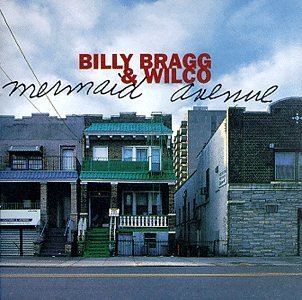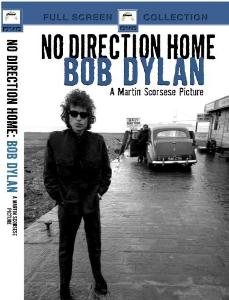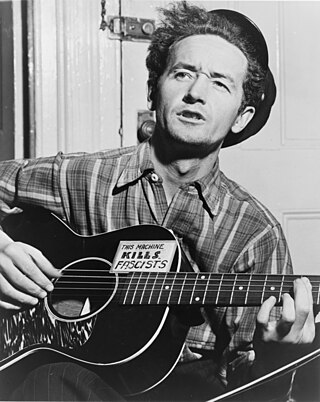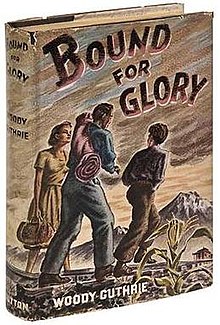
Woodrow Wilson Guthrie was an American singer-songwriter and composer who was one of the most significant figures in American folk music. His work focused on themes of American socialism and anti-fascism and has inspired many generations both politically and musically with songs such as "This Land Is Your Land".

A hobo is a migrant worker in the United States. Hoboes, tramps, and bums are generally regarded as related, but distinct: a hobo travels and is willing to work; a tramp travels, but avoids work if possible; a bum neither travels nor works.

Bound for Glory is a 1976 American biographical film directed by Hal Ashby and loosely adapted by Robert Getchell from Woody Guthrie's 1943 partly fictionalized autobiography Bound for Glory. The film stars David Carradine as folk singer Woody Guthrie, with Ronny Cox, Melinda Dillon, Gail Strickland, John Lehne, Ji-Tu Cumbuka and Randy Quaid. Much of the film is based on Guthrie's attempt to humanize the desperate Okie Dust Bowl refugees in California during the Great Depression.

The Boomtown Rats are an Irish rock/new wave band originally formed in Dublin in 1975. Between 1977 and 1985, they had a series of Irish and UK hits including "Like Clockwork", "Rat Trap", "I Don't Like Mondays" and "Banana Republic". The original line-up comprised six musicians; five from Dún Laoghaire in County Dublin; Gerry Cott, Simon Crowe (drums), Johnnie Fingers (keyboards), Bob Geldof (vocals) and Garry Roberts, plus Fingers' cousin Pete Briquette (bass). The Boomtown Rats broke up in 1986, but reformed in 2013, without Fingers or Cott. Garry Roberts died in 2022. The band's fame and notability have been overshadowed by the charity work of frontman Bob Geldof, a former journalist with the New Musical Express.

"Blowin' in the Wind" is a song written by Bob Dylan in 1962. It was released as a single and included on his album The Freewheelin' Bob Dylan in 1963. It has been described as a protest song and poses a series of rhetorical questions about peace, war, and freedom. The refrain "The answer, my friend, is blowin' in the wind" has been described as "impenetrably ambiguous: either the answer is so obvious it is right in your face, or the answer is as intangible as the wind".

"This Land Is Your Land" is a song by American folk singer Woody Guthrie. One of the United States' most famous folk songs, its lyrics were written in 1940 in critical response to Irving Berlin's "God Bless America". Its melody is based on a Carter Family tune called "When the World's on Fire". When Guthrie was tired of hearing Kate Smith sing "God Bless America" on the radio in the late 1930s, he sarcastically called his song "God Blessed America for Me" before renaming it "This Land Is Your Land".

Ramblin' Jack Elliott is an American folk singer, songwriter and story teller.

Mermaid Avenue is a 1998 album of previously unheard lyrics written by American folk singer Woody Guthrie, put to music written and performed by British singer Billy Bragg and the American band Wilco. The project was the first of several such projects organized by Guthrie's daughter, Nora Guthrie, original director of the Woody Guthrie Foundation and archives. Mermaid Avenue was released on the Elektra Records label on June 23, 1998. A second volume of recordings, Mermaid Avenue Vol. II, followed in 2000 and both were collected in a box set alongside volume three in 2012 as Mermaid Avenue: The Complete Sessions. The projects are named after the song "Mermaid's Avenue", written by Guthrie. This was also the name of the street in Coney Island, New York, on which Guthrie lived. According to American Songwriter Magazine, "The Mermaid Avenue project is essential for showing that Woody Guthrie could illuminate what was going on inside of him as well as he could detail the plight of his fellow man". It was voted number 939 in Colin Larkin's All Time Top 1000 Albums 3rd Edition (2000).

No Direction Home: Bob Dylan is a 2005 documentary film by Martin Scorsese that traces the life of Bob Dylan, and his impact on 20th-century American popular music and culture. The film focuses on the period between Dylan's arrival in New York in January 1961 and his "retirement" from touring following his motorcycle accident in July 1966. This period encapsulates Dylan's rise to fame as a folk singer and songwriter where he became the center of a cultural and musical upheaval, and continues through the electric controversy surrounding his move to a rock style of music.

"Oklahoma Hills" is a song written by Woody Guthrie. In 2001 it was named the official Folk Song of the state of Oklahoma.

I'm Not There is a 2007 musical drama film directed by Todd Haynes, who co-wrote the screenplay with Oren Moverman, based on a story by Haynes. An experimental biographical film, it is inspired by the life and music of American singer-songwriter Bob Dylan, with six actors depicting different facets of Dylan's public personas: Christian Bale, Cate Blanchett, Marcus Carl Franklin, Richard Gere, Heath Ledger, and Ben Whishaw. A caption at the start of the film declares it to be "inspired by the music and the many lives of Bob Dylan"; this is the only mention of Dylan in the film apart from song credits, and his only appearance in it is concert footage from 1966 shown during the film's final moments.
"When the Deal Goes Down" is a love song written and performed by American singer-songwriter Bob Dylan, originally released as the fourth track on his 2006 album Modern Times and anthologized on the compilation albums Dylan in 2007 and reissues of The Essential Bob Dylan beginning in 2010. As with much of Dylan's 21st-century output, he produced the song himself under the pseudonym Jack Frost.
"Song to Woody" is a song written by American singer-songwriter Bob Dylan and released on his debut album, Bob Dylan, in 1962. The song conveys Dylan's appreciation of American folk legend Woody Guthrie. The song is one of two original compositions featured on Dylan's debut album. Dylan also rehearsed the song in a country arrangement during sessions for Self Portrait on May 1, 1970, as heard on the 2021 compilation album 1970.

The American folk music revival began during the 1940s and peaked in popularity in the mid-1960s. Early folk music performers include Woody Guthrie, Lead Belly, Pete Seeger, Ewan MacColl (UK), Richard Dyer-Bennet, Oscar Brand, Jean Ritchie, John Jacob Niles, Susan Reed, Mississippi John Hurt, Josh White, and Cisco Houston. Lead Belly recorded "Cotton Fields" and "Goodnight, Irene" and folk singer Odetta released folk albums. New folk musicians such as Bob Dylan, Neil Young, Joni Mitchell, Peter Paul & Mary, Joan Baez, Martin Carthy (UK) and Dick Gaunghan (UK) recorded 60s, 70s folk songs. The revival brought forward styles of American folk music that had in earlier times contributed to the development of country and western, bluegrass, blues, and rock and roll music.

"Do Re Mi" is a folk song by American songwriter Woody Guthrie. The song deals with the experiences and reception of Dust Bowl migrants when they arrive in California. It is known for having two guitar parts, both recorded by Guthrie.
Goebel Leon Reeves was an American folk singer, born in Sherman, Texas, and raised in Austin.
Bound for Glory may refer to:

Chronicles: Volume One is a memoir written by American musician Bob Dylan. The book was published on October 5, 2004, by Simon & Schuster.
"This Train", also known as "This Train Is Bound for Glory", is a traditional African-American gospel song first recorded in 1922. Although its origins are unknown, the song was relatively popular during the 1920s as a religious tune, and it became a gospel hit in the late 1930s for singer-guitarist Sister Rosetta Tharpe. After switching from acoustic to electric guitar, Tharpe released a more secular version of the song in the early 1950s.

Bound for Glory is a 1956 album by Woody Guthrie and Will Geer. It consists of a selection of songs from Guthrie's Dust Bowl Ballads of 1940 and his Asch recordings of 1944–45, each introduced briefly by Geer with spoken relevant extracts from Guthrie's writings.













